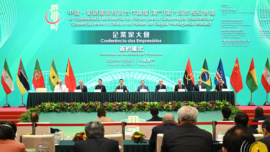Chile’s Senate on Monday agreed to postpone by five weeks an election to choose a commission to rewrite the country’s dictatorship-era constitution, due to a surge in coronavirus infections.
The election was originally due to take place on Sunday until President Sebastian Pinera proposed the delay a week ago.
The Senate’s decision must still be approved by the lower house of Congress.
If it does, the election to decide the members of a Constituent Assembly that will rewrite the constitution — which has been in effect since the Augusto Pinochet dictatorship (1973-90) — will now take place on May 15 or 16.
Campaigning would also be suspended until April 28.
Passing the bill through Congress has taken longer than expected with the opposition putting on pressure for an increase in social measures to help people mitigate the effects of the pandemic.
The Senate debated the proposed delay alongside a raft of economic assistance measures.
But due to changes to the original text, the bill must now return to the Chamber of Deputies for final approval.
In announcing his proposition, Pinera had said on May 28 that “the health of all the inhabitants of Chile” was the priority.
Chile has recorded record new daily infections recently, regularly topping 8,000 — a much higher number than during the first wave of the pandemic.
Chile’s intensive care units are running at 95 percent occupancy.
Some 90 percent of the 19 million population has been put under lockdown for the last 10 days despite Chile making great strides in its immunization program, with seven million people receiving at least one vaccine dose.
Experts have blamed the surge in cases on a false sense of security from the arrival of vaccines, a number of new virus strains and a hasty slackening of containment measures.
Last October, Chileans voted overwhelmingly in favor of rewriting the constitution.
It had been one of the major demands when social unrest broke out in October 2019 and lasted for months.
Mayors and governors will also be up for re-election during the vote.
One of the main sticking points in reaching an agreement on the delay surrounded whether or not mayors could return to work during the hiatus.
The mayors insist they need to carry out their duties but their opponents claim it will allow them to circumvent the ban on campaigning.




















